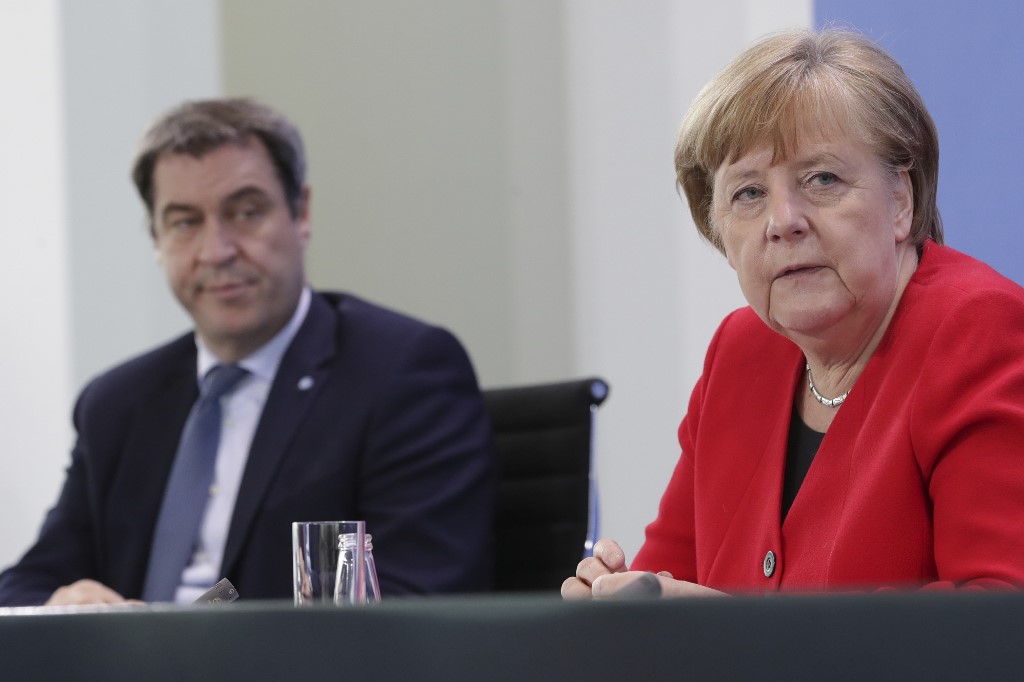Germany is planning an almost complete return to normality in May, with schools and shops reopening and the return of top-flight Bundesliga football matches, Chancellor Angela Merkel said on Wednesday.
All schools and shops will now be able to open as long as they observe hygiene and social distancing rules, with the Bundesliga resuming behind closed doors, Merkel said after a meeting with the leaders of Germany’s 16 states.
“I believe we can say today that we have the very first phase of the pandemic behind us,” Merkel said, adding that Germany had “achieved the goal” of slowing the spread of the virus.
Schools had already been allowed to open, but only so far to older children.
Likewise, only shops up to a certain size have previously been allowed to do business.
In theory Germany’s reopening is immediate. But in practice the 16 states will make separate announcements.
Bundesliga restart
The exact date of the Bundesliga’s restart will be determined by the league, as players will have to undergo a week-long quarantine before matches resume.
Nevertheless, a restart this month means it will be the first of Europe’s top five leagues to return to the field – something that Health Minister Jens Spahn has said could make the competition an “export hit”.
A document with details of the measures agreed said the bolder moves were justified because “even after initial steps to open up were introduced from April 20, the number of new infections remained low,” with “no new wave of infection” so far detected.
Cultural sector has to wait
Only the cultural sector will have to wait, as large events are still cancelled until the end of August. Borders also remain closed.
Social distancing rules will also remain in place until at least June 5, Merkel said.
But while only two individuals from separate households could meet previously, now, members of two households can gather.
Germans will also still be required to wear face masks when shopping or using public transport.
With 164,807 confirmed infected cases of coronavirus including 6,996 deaths, Germany has so far been able to prevent scenes of dire overcrowding in its hospitals as seen elsewhere in Europe.
Merkel has however repeatedly urged caution, warning that it would be a “crying shame” to throw away early successes in containing the deadly disease.
The restrictions – but also greater testing capacities – have seen Germany keep its death rate far lower than that of its European neighbours.
Experts have also urged restraint, with the head of the Robert Koch Institute (RKI) for disease control warning of possible second or third waves of the virus hitting the country.
Tightrope
Like elsewhere, Merkel’s government is walking a tightrope between preventing new deadly outbreaks of the virus and containing the already devastating impact of the lockdown measures.
With the economy now in a deep recession and the ranks of jobless swelling, complaints are growing against Merkel’s conservative approach – which won her a rise in support in the early days of the pandemic.
In recent days, many state premiers have brazenly ignored her pleas for caution on easing coronavirus restrictions.
On the eve of her discussions with regional leaders, Germany’s biggest state Bavaria preempted federal measures by announcing that its restaurants would open from May 18 and hotels and guest houses from May 30.
State premier Markus Soeder said “the time has come for a cautious reopening”, pointing to the “success” in containing the spread of the virus.
Lower Saxony, Mecklenburg-Western Pomerania, Saarland and Saxony-Anhalt have also announced their own plans, covering everything from restaurants to care homes.
Underlining the regional differences in infection rates, Merkel said leaders have agreed on a new “emergency mechanism” which would trigger measures locally if the numbers of new cases were to surge.
Once the number of new cases hits 50 per 100,000 people over seven days, local authorities would be required to impose stay-at-home measures to halt the spread, Merkel added.
“We can afford to take a little courage, but we need to stay cautious,” she added.
AFP
























